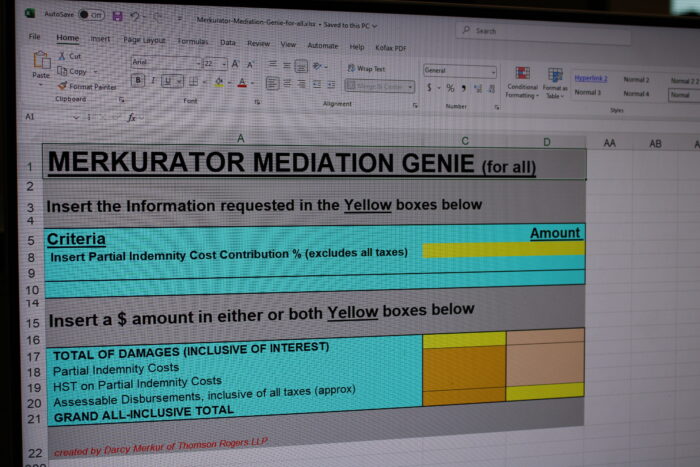Simplifying Motor Vehicle Litigation by Eliminating the “Threshold”
Author(s): Darcy R. Merkur
March 18, 2024

The Ontario Court system is backlogged and the high volume of motor vehicle litigation is part of the problem.
We must improve our justice process. Delayed justice isn’t justice.
Appointing more judges isn’t the only solution. We must change our laws to help solve the problem. We need quicker and cheaper litigation of motor vehicle claims.
One suggestion that will simplify and expedite personal injury motor vehicle litigation is the elimination of the “threshold.”
The “threshold” is a requirement in the Ontario Insurance Act that any motor vehicle accident victim must prove to the satisfaction of a Judge that they have sustained “permanent” and “serious” injuries to qualify to sue for their pain and suffering and for their health care expense.
The “threshold” was introduced decades ago as part of the move to a no-fault benefit system wherein accident victims automatically qualified for certain benefits regardless of fault. In that context and in an effort to discourage litigation associated with minor injuries (like whiplash claims), two legal roadblocks were put in place: a “threshold” and a statutory deductible.
The purpose of the “threshold” was sensible. The “threshold” would serve to curtail motor vehicle litigation by preventing lawsuits from anyone with temporary minor injuries. However, that same goal has been effectively dealt with through the second roadblock being the statutory deductible.
The Ontario statutory deductible, which is indexed with inflation, now stands at $46,053.20. While not disclosed to juries that notoriously decide motor vehicle litigation, the statutory deductible reduces general damage awards for pain and suffering such that only claimants with pain and suffering Judgments of over $46,053.20 receive any compensation for their pain and suffering.
Like the “threshold,” the statutory deductible effectively prevents claims for pain and suffering by those with modest problems resulting from a motor vehicle accident.
As a result of the “threshold,” Plaintiff’s lawyers representing accident victims must always engage pricey and experienced medical-legal experts to evaluate the claimant’s injuries and confirm their view that the Plaintiff has sustained “permanent” and “serious” injuries in keeping with the “threshold.” Reliance on treating experts to address the “threshold” debate is not usually ideal as they are often unfamiliar with the interpretation of the “threshold” and the key elements to consider in relation thereto.
One notable distinction between these two motor vehicle litigation roadblocks, is that one must meet the “threshold” to qualify to sue for health care costs. However, you need not meet the “threshold” to qualify to sue for income loss.
A fortune is wasted by both Plaintiff’s lawyers and by defending insurance companies, evaluating whether or not the claimant’s injuries meet the “threshold.” Further, many insurance companies will raise “threshold” defences as a reason to reject making any significant settlement proposals leading to ongoing and expensive litigation that clogs up the Court system.
At the behest of defending insurance companies, most personal injury motor vehicle litigation is determined by a jury. Nevertheless, the issue of the “threshold” is an issue that must be decided by the Judge thus tying up Judges charged with providing written decisions on the issue of the “threshold.”
The large statutory deductible effectively prevents smaller personal injury claims. You don’t also need the “threshold” to achieve that purpose.
It is recognized that eliminating the “threshold” would remove the roadblock for pursuing claims for health care costs. But, given that claims for income loss can still be advanced without regard to the “threshold”, it is unlikely, that the Courts would be inundated with claims primarily in relation to health care costs. Moreover, you could potentially revise the legislation to only allow claims for health care costs by those that have pain and suffering awards above the statutory deductible. That way, you would still have a roadblock to claims for health care costs without having to debate the “threshold.”
Eliminating the “threshold” would free up our Courts, to some extent, and would reduce the cost of personal injury litigation as well as the length of personal injury trials. It would also allow claims to be advanced quicker as you would not have to wait to see if the injuries were “permanent” in accordance with the “threshold.”
Darcy Merkur is a highly regarded Ontario trauma lawyer helping accident victims such as pedestrians, cyclists and motorists, who have sustained catastrophic injuries.
Darcy is the first lawyer in Canada to be qualified as a Certified Brain Injury Specialist by the Brain Injury Association of America. In addition, Darcy has been recognized as a Certified Specialist in Civil Litigation by the Law Society of Ontario, is listed in peer-reviewed publications – Lexpert® and The Best Lawyers™ in Canada, is ranked AV Preeminent® in Martindale-Hubbell ® and is a partner at Thomson Rogers, one of Ontario’s Top 10 Personal Injury Law Firms as selected by Canadian Lawyer Magazine, and ranked one of the Best Law Firms in Canada by The Globe and Mail.
Darcy can be reached at 416-868-3176 or by EMAIL.
Share this





